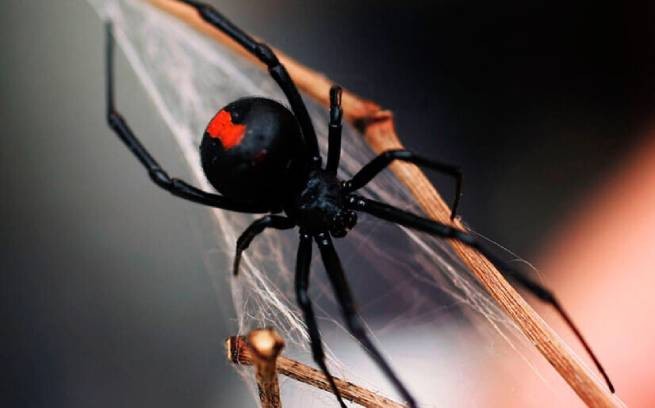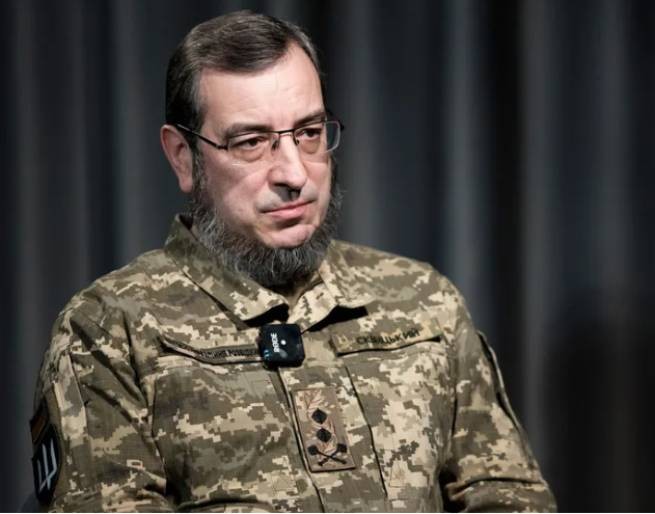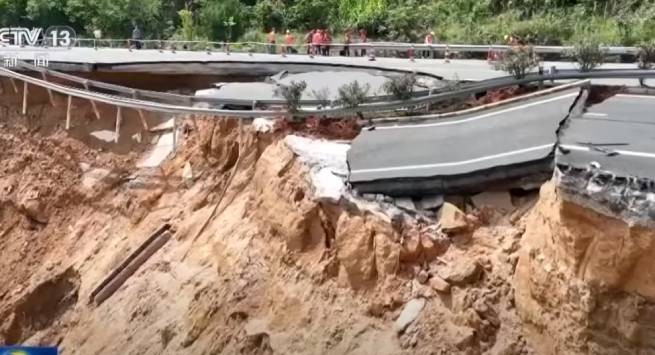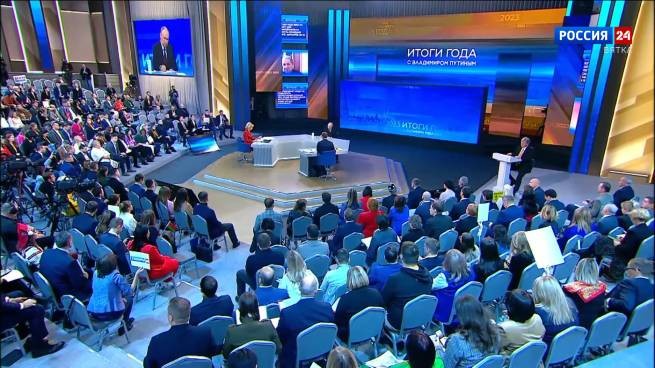This year, Russia decided to combine a “direct line” with the population and a press conference with journalists – two traditional formats. Russian President Vladimir Putin spoke about war and mobilization, abortion and history textbooks, rising prices and the upcoming elections – he was asked more than 50 questions in 4 hours.
BBC publication told about the event, analyzed the main topics and responses of the head of state to pressing issues. You can also listen and watch the press conference on the video provided. The event took place a week after Putin announced his decision to run for a fifth presidential term, so there was special interest in it. And it is not at all surprising that the question of elections was raised first. About the goals that the President of the Russian Federation sets for himself.
Putin’s answer stated that the most important thing is “strengthening the sovereignty of the Russian Federation,” as well as protecting the rights and freedoms of citizens, protecting borders, and developing parliamentarism.
About the war in Ukraine and mobilization
A fairly large block of questions was devoted to the war in Ukraine – about the situation at the front, about a possible second wave of mobilization, about social guarantees and payments to the military, about the financing of the Russian-occupied territories of Ukraine.
Vladimir Putin said that the war will end when Russia achieves its goals, which, according to him, do not change: denazification and demilitarization of Ukraine, its neutral status. He assured the audience that the situation at the front for Russia as a whole was improving, in addition, the Russian military had destroyed many tanks and armored vehicles that Western partners had supplied to Ukraine.
About the timing of the war
Russia will continue to fight with Ukraine for as long as it can, and it can for a long time, Putin is sure. The new norm is a gradual routine call for “volunteers” to go to war, so there is no “need” for a second wave of mobilization “as of today,” the Russian President reassured his citizens.
Moscow does not offer compromises, waiting for the actual capitulation of Kyiv: “There will be peace when we achieve our goals, and they do not change,” Putin added in one of his first statements during the “Results of the Year.” Apparently, the Kremlin has territorial claims on at least one more Ukrainian region, Odessa – Putin called it a “Russian city,” notes the BBC.
The President of the Russian Federation confirmed that he personally intervenes in issues of tactical military command when, speaking about the Ukrainian Armed Forces’ bridgehead on the left bank of the Dnieper, he added that he asked “NGSh (Chief of the General Staff of the Russian Defense Ministry Valery Gerasimov) not to rush to squeeze out” the Ukrainian landing forces from there.
When asked about a possible second wave of mobilization, Putin said that “today there is no need for this,” and he promised volunteers and mercenaries of private military companies to sort out the benefits so that they would be the same as those of ordinary military personnel.
Some numbers and their analysis
Ukrainian edition “Country” writes about the figures announced by the President of the Russian Federation on the size of the Russian army. Putin named three of them:
- There are now 617 thousand Russian military personnel in the “special operation” zone;
- since the beginning of this year, 486 thousand people have been recruited into the warring army;
- last year 300 thousand people were mobilized.
What can we say, based on these figures, about the losses of the Russian army, the publication asks. In February 2022, Russia attacked Ukraine with an army totaling, according to various sources, from 150 to 200 thousand people. We take a certain average figure (175 thousand) and add to the figures mentioned by Putin:
175+300+486=961 thousand. To this figure should be added contract workers who entered into contracts from February to December 2022. But this figure is unknown. And besides, before mobilization, these contracts were fixed-term (from 2 months) and many did not renew them. Plus those mobilized in the “LDPR” (the exact figure is unknown, minimum estimates are 50-60 thousand people). It is also necessary to add more numbers to the Wagner PMC (according to the Wagnerites themselves, 78 thousand people went through them during the war).
That is, if we take these figures according to the most minimal estimates and add them to those named by Putin, we get 1.1 million people who have gone through the war in Ukraine over the entire period. We subtract from this figure the current size of the army operating in Ukraine (617 thousand), as stated by Putin. And we get data on the total losses of Russia in the war in Ukraine (killed, those who did not return to duty after being wounded, missing persons, prisoners) – 483 thousand people.
But this is provided that the figures mentioned by Putin correspond to reality. For example, experts question the number of almost 500 thousand contract soldiers who, according to Russian authorities, have joined the Russian army since the beginning of this year. Experts believe that in reality there are much fewer of them – 200-300 thousand people. It is also not a fact that the size of the active army of 617 thousand people named by Putin corresponds to reality. The actual number during wars, as a rule, is not stated. And publicly announced figures can be either overestimated or underestimated.
Financing of the occupied territories
For the Russian-occupied territories of Ukraine, the picture is colorful. The President, writes the BBC, promised that Moscow would annually invest a trillion rubles in these territories. Is it a lot or a little? In total, 26.8 trillion rubles were spent from the federal budget in the first 11 months of this year – it seems that 1 trillion rubles of this amount is not so much. The budget deficit for 11 months amounted to 878 billion – this is almost equal to the amount that Putin promised to invest in the occupied regions. At the same time, we should not forget that Russia is now restoring Ukrainian cities that it destroyed.
About the ban on abortion
Ekaterina Berezovskaya, the host of the event, asked Putin what he thought about the prospect of banning abortions in private clinics. Putin responded like this:
“You know, I remembered the prohibitions in the alcohol campaign. We remember what this led to. To an increase in surrogate, an increase in victims of poisoning by these surrogates. And in the area you mentioned, we need to act carefully.”
And he added that, on the one hand, “the rights and freedoms of women must be respected,” and on the other, “the state is interested in ensuring that the demographic problem is solved, so that women make decisions in favor of preserving the life of a child,” and also recalled the church’s position on this issue. The solution to the problem, he said, should be sought “by turning to traditional values” and by “establishing order” in antenatal clinics.
About economics
Putin also spoke about the Russian economy. It demonstrated “a sufficient margin of safety,” Putin assured at the very beginning of the “straight line.” True, later he still had to answer a question about rising egg prices. The Russian president had to apologize for the current situation and promise to sort it out. According to Putin, the rise in egg prices in Russia occurred both because of a “failure in the work of the government” and because of the growth in incomes of Russians – if incomes grow, then prices rise, he believes. It also followed from his explanation that Russia was late in allowing the import of eggs.
The resilience of the Russian economy also has its own explanation: extensive military spending. They lead to industrial growth, largely driven by defense-related sectors. They also provoked an increase in incomes of the population due, again, to the defense sector, as well as the salaries of those participating in the war in Ukraine. However, not all so simple. This has also led to some imbalances in the Russian economy, notes Olga Shamina, editor of the economics department of the BBC Russian Service.
About world events
The conflict in the Middle East, according to the Russian president, can be resolved through the creation of a Palestinian state with its capital in East Jerusalem. In response to a question about the possible normalization of relations between Russia and the European Union, the Russian President again reminded that “this depends not only on us.” He repeated his thought about Europe’s dependence on its “big brother,” meaning the United States, but – traditionally – added that Russia is ready for contacts with both Europe and the United States. The fact that such contacts actually exist became clear from Putin’s answer to a question about Wall Street Journal journalist Evan Gershkovich, who, according to the US State Department, recently could not be exchanged because Russia refused such an offer.
Putin responded by saying that “there are contacts with American partners,” and “dialogue is ongoing,” and it is taking place “in a language that each other understands.” There is very little left – the American side must make an offer that will suit Russia, it followed from his words. In the fall, Western media wrote that the main candidate for a possible exchange is considered to be former FSB officer Vadim Krasikov, who is serving a life sentence in Germany for the 2019 murder of former Chechen field commander Zelimkhan Khangoshvili in Berlin.
About Russian journalists
It was about the imbalance in punishments under various articles of the Criminal Code, when murders are often given lighter punishments than economic crimes. As an example, journalist Alexandra Bayazitova was cited, whom the prosecution asked for 14 years under an article of extortion (she was eventually sentenced to five years).
“Well, don’t go too far, what kind of witch hunt, what did she do to be hunted? Is she a major opposition figure?” Putin said. After that, he admitted that the need to put a person behind bars for 14 years also raises questions for him. He promised that he would instruct legislators to evaluate the severity of penalties for economic crimes.
About the new history textbook
When asked why the authorities decided to introduce a new unified history textbook in schools, Putin replied that previously the textbooks contained “anything you want” and “almost nothing was said about the significance of the Battle of Stalingrad.” He is confident that there should be “a state version that should be communicated to everyone.” However, according to education experts, the new textbooks only reflect the Kremlin’s view of history.
“Inconvenient” questions
During the live broadcast of Putin’s press conference, while the presenters are asking very general questions, many “uncomfortable” questions are displayed on the screen:
– why does your reality differ from our reality?
– How long will you tolerate Gazprom’s corruption?
– how can you move to Russia, which is talked about on Channel One?
– officials have accounts and real estate abroad! How can they occupy high positions?
– make normal prices!
– What is our country fighting for in Ukraine?
– when will the war end?
– why, having moved to Crimea across the bridge, does mobile communication include roaming, if Crimea is Russia?
– When will the mobilized be released? Why should 300 thousand people serve for the entire country?
SPECIAL BREAK. DIRECT LINE WITH PUTIN DECEMBER 14, 2023







More Stories
China: highway collapse, dozens of victims and injured (video)
A terrible tragedy in Kyrgyzstan: a truck hit 29 children at a festive event (video)
A 48-year-old Ukrainian was killed in Hungary